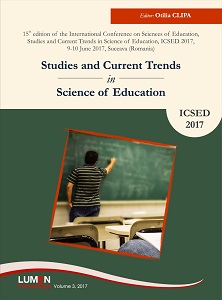Non-formal and Informal Education Activities in Teaching Romanian as a Foreign Language
Non-formal and Informal Education Activities in Teaching Romanian as a Foreign Language
Author(s): Ileana-Silvia Ciornei
Subject(s): Social Sciences
Published by: Editura Lumen, Asociatia Lumen
Keywords: non-formal education; informal education; teaching; linguistic competences; intercultural communication.
Summary/Abstract: Education is defined as an institutional organized activity with educational finalities having three fundamental forms: formal, non-formal and informal education. Formal education is a structured activity whose explicit purpose is teaching students in a school environment. Non-formal learning is a planned activity, with learning objectives and different duration which does not follow a curriculum or lead to certification. Informal learning is defined as learning resulting from daily life activities related to work, family or leisure, not organized in terms of objectives, time and learning support, in most cases unintentional from the learner’s perspective. Communication in foreign languages also is related to key competences such as competence in foreign languages, social and civic competences and cultural awareness and expression. It is very important for learners who study a foreign language to experience real communicative situations in order to develop their language proficiency. Non-formal and informal education activities create the opportunities for the international students who learn Romanian to interact in ways that allow developing knowledge and skills. The activities organized with the international students develop in many directions- Christmas and Easter events, meetings with Romanian students, The International Student’s Day, the Scientific Conference and extra mural activities. We may affirm that these types of educational activities play an important role in the learning of Romanian language by the students in the Preparatory year. Despite certain disadvantages, they help to develop social relationships, to improve cross-cultural and language skills and contribute to personal fulfillment and future social inclusion in the Romanian society.
Book: Studies and Current Trends in Science of Education
- Page Range: 100-106
- Page Count: 7
- Publication Year: 2018
- Language: English
- Content File-PDF

